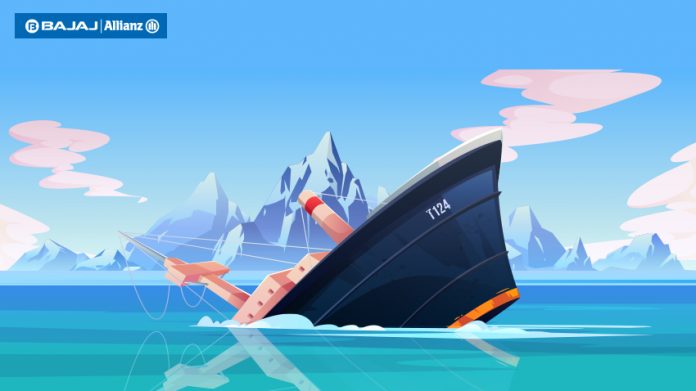This article has been written by Arushi Seth, pursuing a Diploma in M&A, Institutional Finance, and Investment Laws (PE and VC transactions) from LawSikho.
Table of Contents
Introduction
Remember the Titanic, which was interestingly christened an “Unsinkable Ship”? Well, the magnificent ship met its tragic end on her maiden journey itself, claiming the lives of over 70% of the crew and passengers on board and submerging cargo, worth approximately $9.5 million today, deep into the Atlantic ocean. But one noteworthy point, in the present context, is that ‘The Oceanic Steam Navigation Company’, popularly known as the ‘White Star Line’, insured the Titanic for a sum which today is equivalent to $133 million, and the insurance policies, interestingly, covered almost all of the property claims, thus relieving some of the burdens of the investors.
The tragedy of the Titanic set a precedent that even a vessel built with the most innovative technology does not ensure absolute certainty of its survival. Maritime transport is a very risky endeavor, which is constantly threatened by the presence of both man-made as well as natural perils. The vessels and the cargo are endowed with enormous sums of investments by a multitude of investors. Marine insurance, therefore, provides solace to these distraught investors in times of crisis, by securing some of the investments undertaken by them.
What is Marine Insurance?
Before diving deep into the sea of marine insurance, it is imperative to understand the meaning of ‘insurance’. The dictionary suggests that the word “Insurance” means, coverage by contract whereby one party undertakes to indemnify or guarantee another against loss by a specified contingency or peril. Marine insurance, therefore, is a type of insurance that covers the losses or the damages caused to the cargo of any ship, or the ships, cargo vessels, terminals, or any marine transport in which goods are carried from the point of origin to the final destination. It also covers the risks faced by various intermediaries. It provides comprehensive coverage for all the probable risks faced by a vessel at the sea.
Marine transport faces a relatively higher degree of threat as compared to the other modes of transport, such as road, rail, and air. The range of perils offered by the sea is very wide, ranging from weather or natural hazards to cross-border conflicts to pirate attacks. It not only becomes essential for all the people associated with a particular ship (the shipowner, the cargo owners, the intermediaries, etc.) to avail a marine insurance policy, the law mandates all the vessels engaged in commercial transport to have a suitable marine insurance policy to mitigate the potential risks. The Marine Insurance Act, 1963, which is on the lines of its predecessor, The English Marine Insurance Act, 1906, regulates the principles and law of marine insurance in India.
Types of Marine Insurance in India
Due to a very wide ambit of marine insurance, different categories of it are classified based on different factors. Broadly, the classification of marine insurance in India depends on two factors – the coverage area of the insurance policy, and the structure of the insurance contract. Each of the two categories is further sub-categorized, based on the different needs and suitability of the person entering into the insurance contract.
Types of Marine Insurance – based on coverage area
The coverage area of an insurance policy is the geographical area or the protected area in which the benefits of an insurance policy apply. The following types of marine insurance are classified, based on the coverage area of the insurance policy –
- Hull & machinery insurance – Hull is the most noticeable part of any ship. It is the watertight body of a ship or a boat that protects the cargo inside the ship from being damaged. Hull and Machinery Insurance, therefore, covers the loss or the damage caused to the body of the ship or any machinery or equipment in it, used for the functioning of the ship. It mostly covers accidents caused due to collisions, or the damages caused by earthquakes and explosions. This type of insurance is generally taken by the owners of the ship.
- Marine cargo insurance – Marine cargo insurance is a type of property insurance that covers the cargo owners against any loss or damage caused to their cargo during its transit. It has extensive coverage, but also has certain limitations, for instance, the cargo owners lose their claims if the packaging of the cargo was defective. It also comes with a third-party liability, which covers the damages caused to the port, or a ship, or a railway track due to the presence of defective cargo.
- Liability insurance – Liability insurance covers the financial liability of the person who is insured. It covers primarily the liabilities which arise due to the damages or injuries caused to the third party, for instance, the death or personal injury caused to any third party traveling in the ship.
- Freight insurance – Freight insurance covers the liability of the shipping company or the logistics provider for the damage or loss caused to the shipment during transit due to events outside the control of the company.
Types of Marine Insurance policies – based on the structure of the contract
A ‘policy is a document that embodies the terms and conditions of the contract of insurance. It essentially is a written form of agreement between the insurance company and the person insured. It generally contains the provisions regarding the coverage area, the limitations of insurance policies, etc. Thus the different types of policies available under marine insurance are –
- Open policy – An open policy, also called a floating policy, provides coverage for an indefinite number of transit journeys during the subsistence of the policy. This is especially beneficial for the companies which are involved in high-volume trade, as they are saved from taking an insurance policy on each transit journey. It covers all the transit journeys of the insured until the policy is canceled or until the last of the payment is realized, whichever is earlier.
- Voyage policy – A voyage policy works on the same lines as the marine cargo insurance. Under this policy, the insurance company agrees to cover the losses or damages caused to the cargo during a specific voyage. It expires when the vessel reaches its destination, irrespective of the time it takes to reach there. Usually, it is bought by small exporters who ship their goods by sea only on some occasions.
- Time policy – A time policy, as the name suggests, is issued for a fixed period of time. The vessel may make any number of voyages during this period. Generally, the insurance company issues this policy for one year, however, the period may vary depending on the agreement between both parties.
- Mixed policy – A mixed policy is a combination or a mix of voyage and time policies. The insurance company, while issuing this policy, agrees to cover the loss or damage to the ship for a particular voyage till a particular period of time.
- Single vessel policy – A single vessel policy insures only a single ship of the insured.
- Fleet policy – The person insured has an option of either insuring a single ship by a policy, or of insuring several ships under one policy. If he chooses the latter option, he undertakes a ‘Fleet Policy’, under which a fleet of ships is insured under a single policy.
- Unvalued policy – Every insurance policy is either an unvalued or a valued policy. Under an unvalued policy, the insurance company does not assign a value to the thing insured (the vessel or the cargo), at the time of underwriting the policy. The valuation of the property is done only after the claim of insurance has been filed. However, for a successful claim, the true value of the property has to be proved by the insured by way of invoices or estimates, before the valuation.
- Valued policy – In a valued policy, the insured property is given a specific value when the policy is issued, and before any claims are made. When the claim is made by the insured, a pre-estimated or the specified amount is given, which does not depend on the amount of loss incurred by the insured. The depreciation of the property also does not affect the amount of claim, under a valued policy.
- Block policy – A block policy is an all risks policy. Unless a contrary intention is expressed by the insurer, it essentially covers all the risks to which the goods are exposed when they are in transit, bailment, and on the premises of the third party. There are two popular types of block policy – furrier’s block policy, and jeweler’s block policy since fur and jewelry are two high-value commodities that are exposed to a greater threat of theft.
- Port-risk policy – A port-risk policy covers ships that are either docked or are undergoing repair works at the port. It is an all-risk policy that covers all the risks unless otherwise agreed between the parties. It provides coverage for physical damages to the vessel as well as protection and indemnity but excludes any liability arising on account of the crew and cargo.
- Named policy – A named policy is one in which the name or names of the ships is mentioned in the contract of insurance.
- Wager policy – A wager policy protects from loss of the property of which the insured does not have legal proof of possession. This means, when the insured is not able to prove an insurable interest in the property, the insurance company may issue a wager policy to him. Under it, the whole claim of the insured is subject to the discretion of the insurer and the merits of the claim made. It is not a written policy as it is issued in contravention of the law.
Conclusion
Marine insurance has always been more popular than its peers, mainly because of the persistent and comparatively larger number of threats faced by marine transport. With the deteriorating conditions of the environment, and an upward trend of cyclones and hurricanes forming in seas in recent years, no one can foresee the potential risks to marine transport. In this vast pool of uncertainties, the only certainty cargo and ship owners have is of the compensation by way of insurance, as the law in India mandates all the people engaged in commercial transport to buy an insurance policy suitable to their business. Marine insurance has an impressive array of policies, which cater to the needs of almost all of the business owners and people associated with a particular shipment or consignment. It ensures that not even the smallest intermediary is left with losses due to events out of their control. However, irrespective of the benefits it provides, marine insurance is not void of limitations, drawbacks, and loopholes. Therefore, it is always advised to the people buying a marine insurance policy to determine their needs before they make any agreement with the insurer.
References
- https://upscapital.com/resources/the-bottom-line-titanic/
- https://www.marineinsight.com/maritime-law/different-types-of-marine-insurance-marine-insurance-policies/
- https://www.paisabazaar.com/commercial-insurance/marine-insurance/
- https://www.bajajallianz.com/blog/knowledgebytes/types-of-marine-insurance.html
- https://www.investopedia.com/terms/o/open-cover.asp
- https://www.investopedia.com/terms/v/voyage-policy.asp
- https://www.investopedia.com/terms/v/valued-marine-policy.asp#:~:text=A%20valued%20marine%20policy%20is%20a%20type%20of%20insurance%20coverage,to%20a%20claim%20being%20made.&te
Students of Lawsikho courses regularly produce writing assignments and work on practical exercises as a part of their coursework and develop themselves in real-life practical skills.
LawSikho has created a telegram group for exchanging legal knowledge, referrals, and various opportunities. You can click on this link and join:
 Serato DJ Crack 2025Serato DJ PRO Crack
Serato DJ Crack 2025Serato DJ PRO Crack









 Allow notifications
Allow notifications


